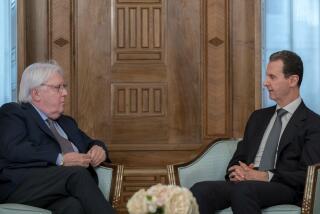Arab leaders meet, Tunisia on their minds
- Share via
Reporting from Cairo — The uprising in Tunisia and the toppling of President Zine al Abidine ben Ali dominated the annual Arab Economic Summit, which opened Wednesday in the Egyptian resort of Sharm el Sheik amid fears that unrest could ripple across the Middle East.
“It is on everyone’s mind that the Arab soul is broken by poverty, unemployment and general recession,” warned Amr Moussa, chief of the Arab League. “The Tunisian revolution is not far from us. The Arab citizen has entered an unprecedented state of anger and frustration.”
The tone throughout the day was somber as leaders of the Arab League, a 22-nation regional organization based in Cairo, reflected on citizens’ growing dissatisfaction with the region’s deepening social and economic problems. The specter of Tunisians taking to the streets and bringing down an autocratic regime last week infused the meeting with a sense of urgency as leaders sought eloquent phrases to underscore the dangers facing them.
“There are countries disintegrating, people rising up and rights being lost while the Arab citizen wonders if there is an Arab system that would deal with these events effectively and efficiently,” said Kuwaiti Deputy Prime Minister Sheik Mohammad al Sabah al Salim al Sabah, who is also the country’s foreign minister.
“The Arab citizen might wonder if such a system would identify the human suffering, in their living conditions, health, education and future and provide a better and dignified life,” he said.
Some nations have already begun to attempt appeasement. Kuwait is dispensing food coupons and grants to its citizens. Jordan has offered a $230-million package to create jobs and help ease the burden of rising commodity prices. Egypt has promised the benefits of its economic changes will begin trickling down to the working class and poor.
Such actions — along with what is expected to be a $2-billion pledge by Arab League members for job creation and economic development — are an indication that Arab capitals worry the furor in Tunisia could ignite protests across the Middle East after years of outrage over human rights abuses and widespread frustrations over poor living conditions. The question is will nations that have not fulfilled previous promises follow through now, especially on programs aimed at disaffected, jobless youths.
The weeks of protests that forced Ben Ali to last week were triggered by the self-immolation of a 26-year-old college graduate who worked as a street vendor and was harassed by police and frustrated by a lack of economic opportunities. Nearly 10 other cases of people setting themselves on fire were reported this week in Egypt, Algeria and Mauritania.
Though some Arab leaders fear the possibility of public unrest, Moussa emphasized that the “priority of economic and social cooperation” between Arab countries “is no longer just about the progress of our people, but a basic demand of Arab national security.”
Dissidents and activists regard the events in Tunisia as an opening for revolution but police and security forces in countries such as Egypt and Jordan are skilled at crushing protests. Disparate opposition parties and animosities among Islamic conservatives and moderates have weakened protest movements in much of the region. Arab leaders, however, seemed uncertain where things were heading.
“Conditions in Tunisia are different than ours and every country has its own climate,” said George Ishak, a long-time Egyptian opposition leader. “But the suicides happening here and other countries are a sign of how people will be willing to sacrifice in order to reach positive change. People here have been suffering for so long and many have already put themselves on fire or hung themselves but they went unnoticed. Now the situation is different and people will not believe any false promises from corrupt Arab leaders anymore.”
Kuwait’s emir, Sheik Sabah al Ahmed al Jabbar al Sabah, called on Tunisia’s political powers to unite and end the ongoing disagreements over a transitional government: “We look forward to efforts toward solidarity in Tunisia to overcome this particular stage and reach a national consensus that will achieve stability and security.”
Hassan is a news assistant in The Times’ Cairo Bureau.
More to Read
Sign up for Essential California
The most important California stories and recommendations in your inbox every morning.
You may occasionally receive promotional content from the Los Angeles Times.











